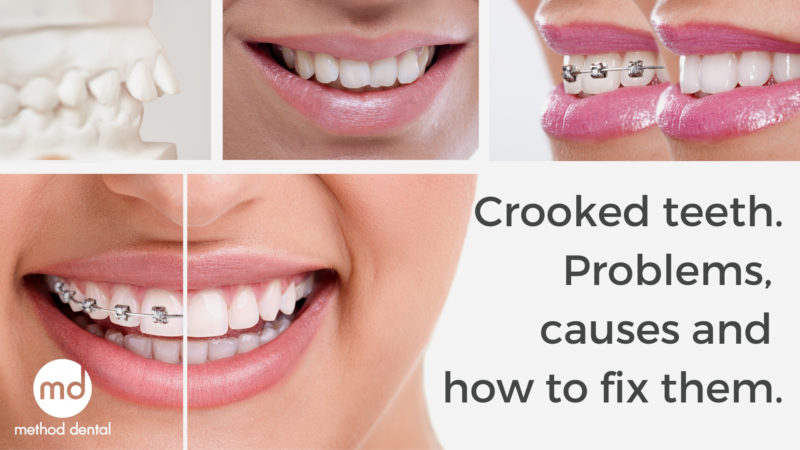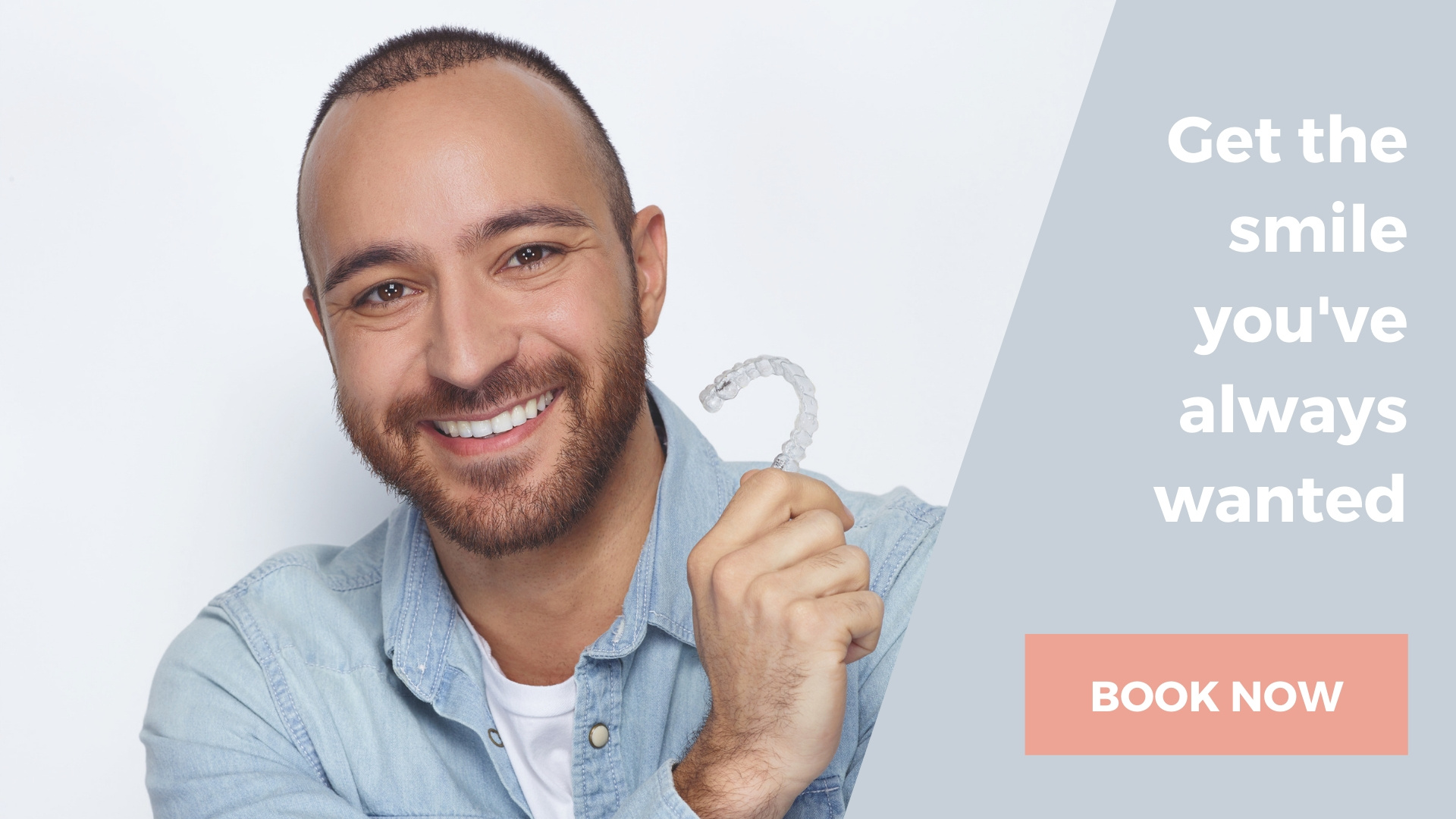Crooked teeth suck. Crooked teeth can be embarrassing. But there’s other problems too because food can get stuck in all the wrong places and crowded teeth are harder to keep clean.
I had crooked teeth, so did my brother, cousins, friends, etc. From personal experience, I know my overbite made my feel really self conscious. I smiled less freely because I wasn’t proud of how I looked. I laughed less. But then I got braces! Thank god!
But what I didn’t realise is that crooked, misaligned teeth can affect more than just your self-esteem. We’re going to dive deep into why some people get crooked teeth and some don’t, some self-esteem stuff, how having crooked teeth affects your health and what you can do to them!
Why are my teeth crooked?
People often ask, “why are my teeth crooked?” or “why are my children’s teeth crooked?”. Unfortunately, there isn’t a simple answer to these questions. Teeth can become crowded or grow into the wrong position for a number of reasons. Genetics, trauma, growth deformities, habits i.e thumbsucking and other serious health conditions can all have a role to play.
What Causes Crooked Teeth?
Genetics and crowded teeth
Well, what can I say? We get what we get and we don’t get upset. None of us have control over our genetic makeup. There’s a fair chance you’ll have teeth issues like crowding if one or both of your parents had crowded or crooked teeth. You can also inherit malocclusion (overbite or underbite), which is where your top and bottom jaw are different sizes or malformed. This can result in an overbite or underbite.
An overbite is where your upper teeth sits over your bottom teeth more than they should. Whereas if you have an underbite, your lower jaw sits out further than your upper jaw. Increased overjet occurs when the upper front teeth sit out further than the bottom teeth, and it is commonly mistaken for overbite.
But just because we’re born with crooked or misaligned teeth, it doesn’t mean that we have to live with it for the rest of our lives.
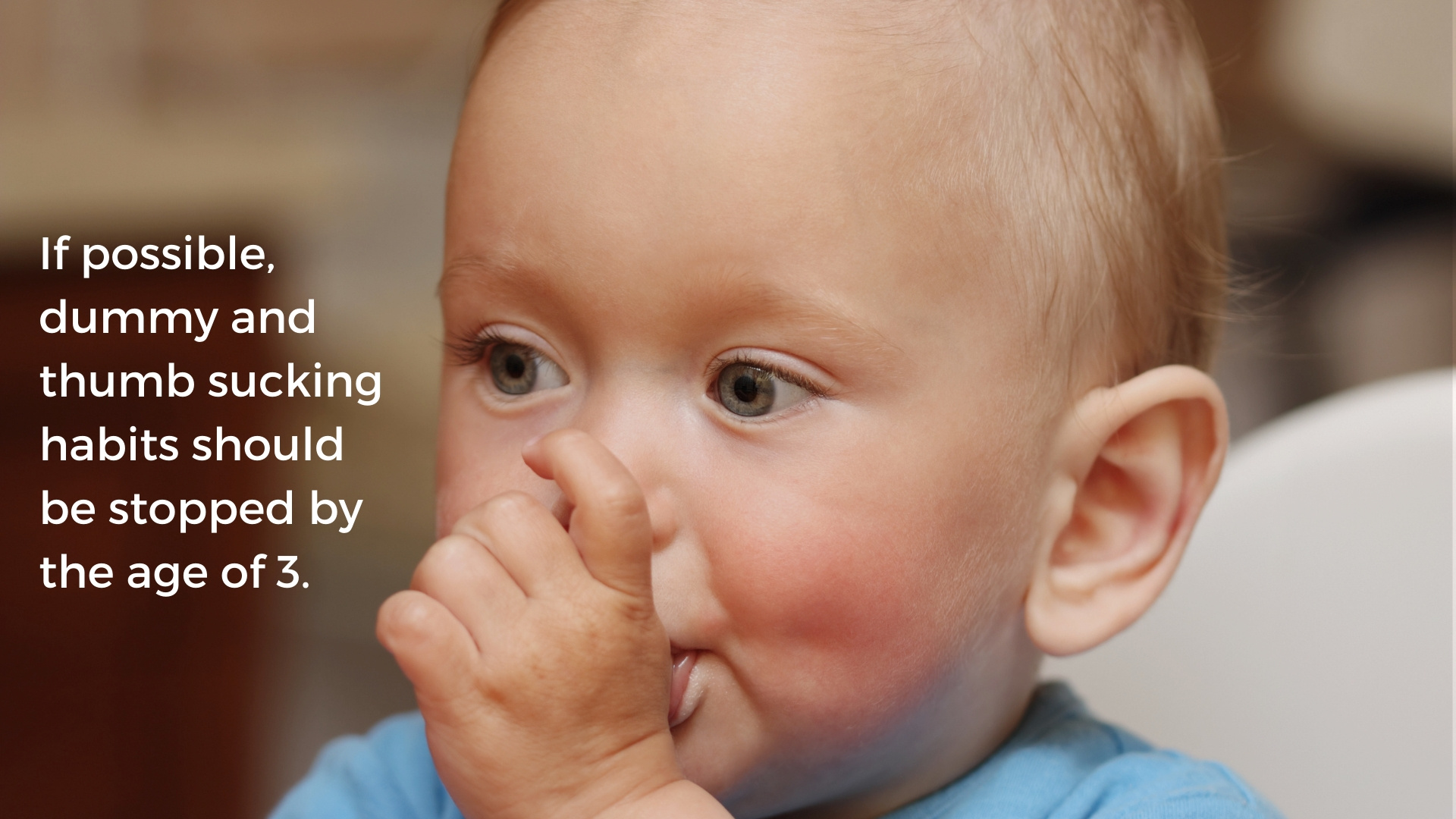
Thumb sucking, dummies and crooked teeth
Prolonged thumb sucking or pacifier use can cause baby teeth, and consequently, adult teeth to become crooked or misaligned.
For a closer look at thumb sucking and dummy use click here.
Most children naturally give up thumb sucking/dummy habits between the ages of 2-4 years of age. Changes to the development and shape of the jaw can occur when kids continue these habits past the age of 5. These habits can result in misalignment of the adult teeth when they eventually come through and mismatches between the upper and lower jaws.
It’s important to note that the intensity of the sucking plays a significant role in what dental problems may result. If the child passively sucks on their thumb, the damage may be limited and the habit may be easier to discourage. Vigorous sucking on the other hand can lead to changes in the palate, affecting the permanent bite. Vigorous sucking is also usually more difficult to end without stronger deterrents.
Ideally, a dummy should be discarded and thumb sucking habits should be stopped before a child turns three years of age.
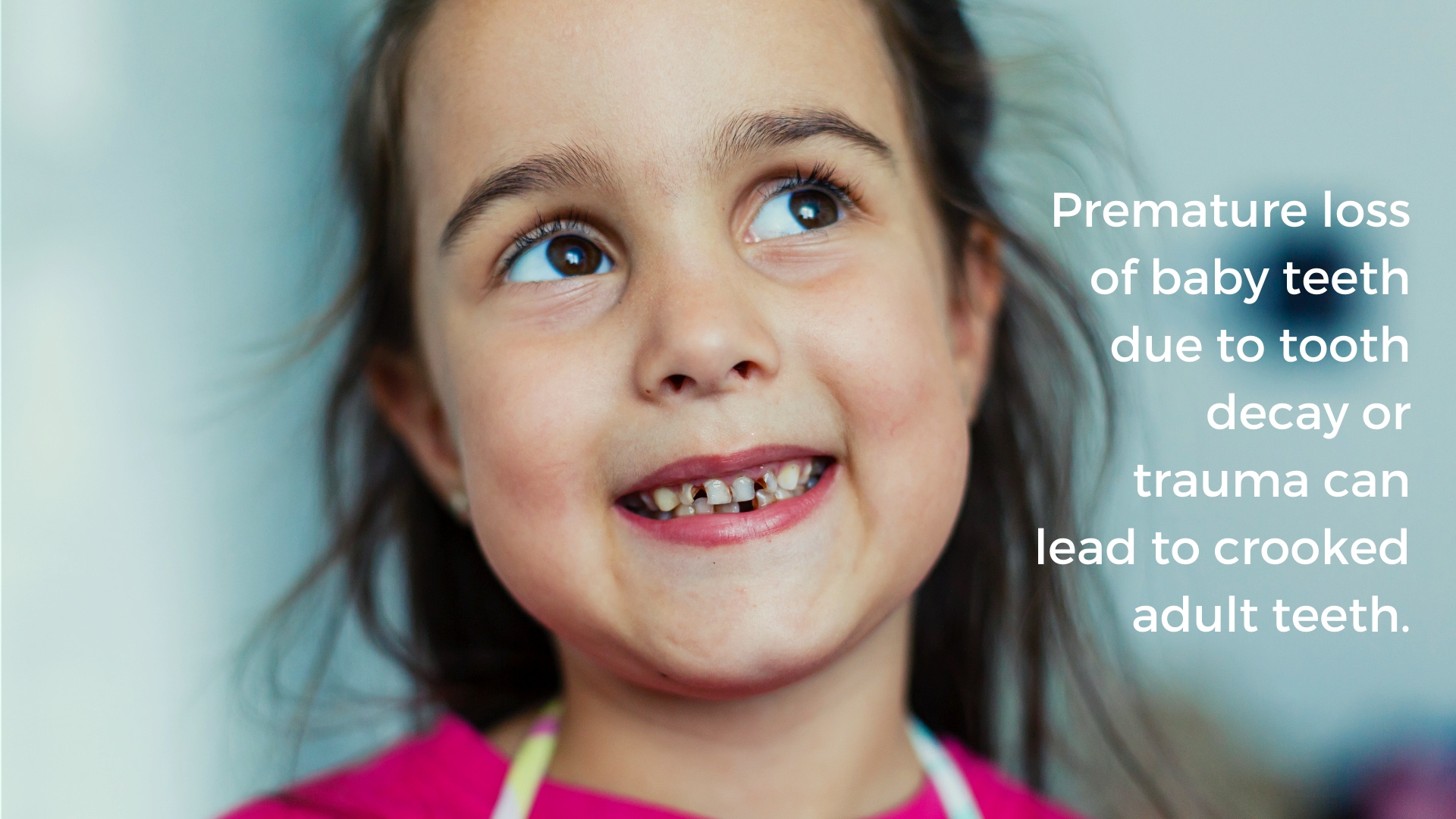
Premature loss of baby teeth and crowding
Baby teeth are a lot more valuable than most of us are led to believe. They help your child eat, talk, smile and importantly, they act as placeholders for the adult teeth to come through.
You can read more about the importance of baby teeth here.
If a child loses a baby tooth too early (either from tooth decay or trauma), the neighbouring teeth can drift into the empty space. When teeth move into spaces they shouldn’t it affects the available space for other adult teeth to come through.
Early and regular dentist visits will give your trusted dentist an opportunity to monitor the development and growth of your kids teeth and jaws. Problems can be addressed in a timely manner and early intervention orthodontics can be begun if needed.
Congenitally missing teeth and orthodontic problems
There are some really unlucky people out there that are born without certain adult teeth. Missing adult teeth through no fault of your own is a tough thing to go through.
The most common missing adult teeth are incisors and premolars. Wisdom teeth may also fail to grow in some people.
Aesthetic or cosmetic issues are common when kids are missing adult teeth. But it’s important to consider functional problems too. That means there can be problems with chewing or even extra loads on teeth during a lifetime leading to premature cracking and breakdown.
Bringing kids to your trusted dentist early and often helps to reduce tooth decay and gum disease, but missing adult teeth can also be detected early too. Early detection can lead to early intervention and a much better outcome with orthodontics.
Trauma and teeth crowding
I guess this one is pretty self explanatory. A blow to the face or mouth can knock teeth out of place, resulting in crooked teeth. Trauma to the jaw can also affect how the teeth come together. This is why if you or your child play contact sports, wearing a custom-fitted mouthguard is super important. It will be the best investment you could ever make!
A custom made mouthguard by your dentist is far superior to any over the counter option due to the superior fit. Custom mouthguards are designed specifically to fit the exact contours of your mouth, they are resilient, they balance your bite and allow for more natural speech and breathing. They are able to absorb shock and spread the impact of a damaging blow to prevent injuries to your lips, cheeks, teeth and tongue and prevent a concussion.
Custom mouthguards truly offer the best protection for your mouth.
Find out more about custom mouthguards here.
Missing teeth and crowded teeth
Even as an adult, our teeth are constantly moving. When you lose a tooth, like a falling domino, the neighbouring teeth will naturally want to shift into the empty space. Unlike losing a baby tooth, your adult tooth is your last and final option. There are no replacements (not natural ones anyway) after that. The more teeth you lose, the more dominos fall, the worse the problem becomes. And when your bite is no longer aligned, you run into other troubles like increased risks of teeth breaking, jaw joint pain etc.
Always consider trying to save teeth if they are suffering problems like toothache. While extracting a tooth may seem like an easier, cheaper option, in the long run you may pay for it in other ways.
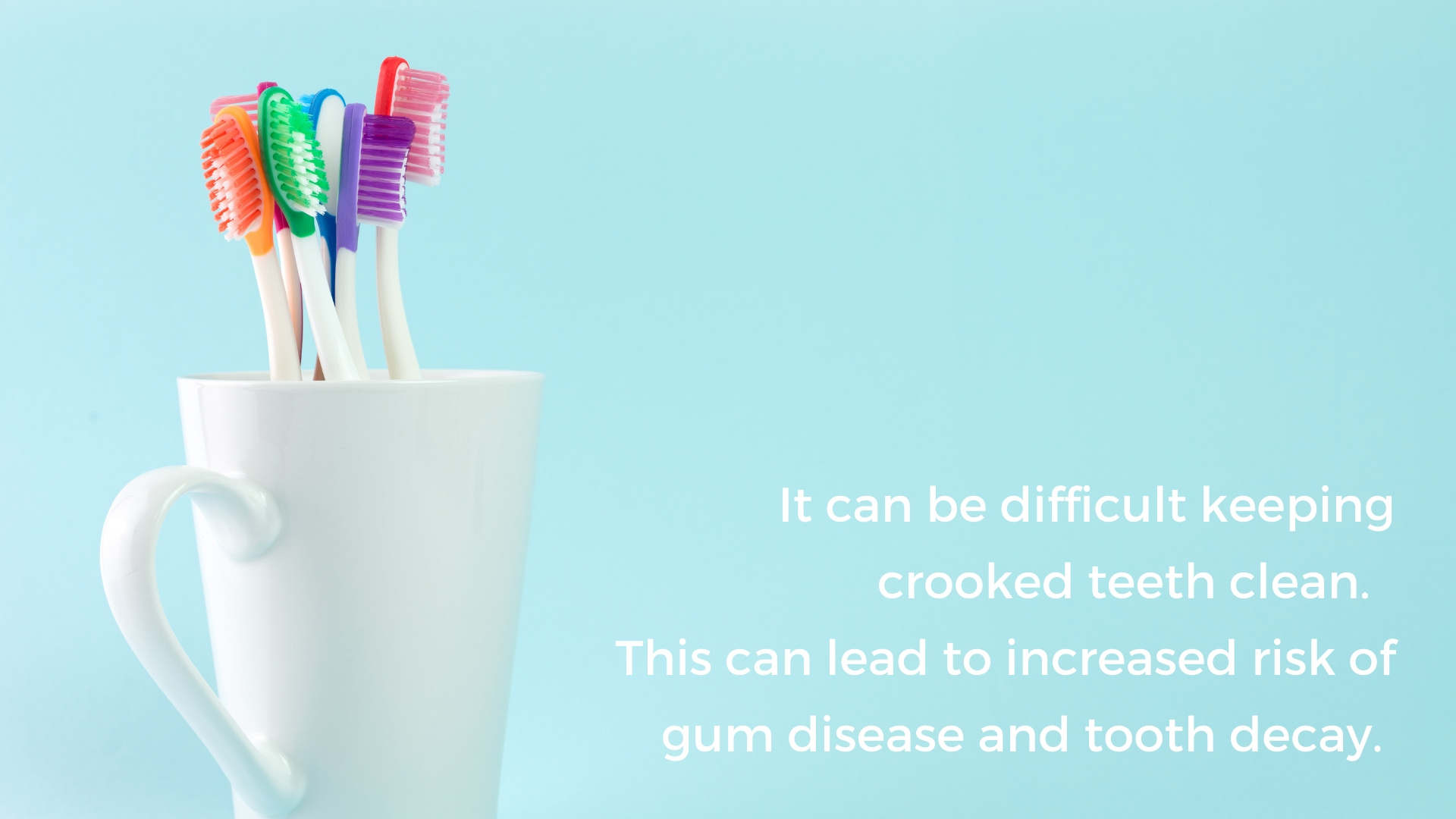
Problems with Crooked Teeth
What problems do crooked teeth cause? It depends.
Having crooked teeth isn’t necessarily a bad thing. If the function of your teeth if not affected or the quality of your life, then it may not really be a problem. If your trusted dental professional is happy that you aren’t at risk of developing oral health issues, and you’re happy with how it looks, it’s all good.
But most people who have crooked teeth are affected by it in some shape or form. From personal experience, I know it significantly affected my self esteem but also, I didn’t realise how much it affected my ability to eat.
Problems caused by crooked or misaligned teeth can include:
Increased risk of gum disease – It can be hard for toothbrush bristles and floss to reach the nooks and crannies between crooked teeth. This can lead to plaque (film of bacteria) building up under the gumline, irritating the gums which prompts your immune system to fight back. This can lead to severe gum disease where your teeth can even fall out! You can find out more about gum disease here.
Difficulty keeping teeth clean – As previously mentioned, it’s hard to properly clean in between crooked/crowded teeth. Food can get caught between or around teeth and that can be incredibly annoying. But it can also lead to increased risk of bad breath, gum disease and tooth decay.
Increased tooth wear – Crowded/misaligned teeth can cause uneven biting pressure when your top and bottom teeth come together. This can lead to your tooth enamel wearing away more or cracking and breaking in areas where there’s more pressure.
Increased risk of tooth injuries – Imagine someone with buck teeth falling flat on their face. Their protruding upper teeth will bear the brunt of the force when they fall and they’ll be the first teeth to break/crack.
Difficulty chewing – Misaligned teeth may come together in a way that prevents normal jaw alignment, making it difficult and painful to chew. Imagine not being able to enjoy your food! This can affect your quality of life significantly.
Self-esteem problems – From experience, I couldn’t agree with this more. Having crooked teeth can affect your self-esteem in such a big way. You feel more self-conscious, embarrassed. You avoid smiling and sometimes laughing because you couldn’t bear the thought of someone else seeing your crooked teeth. It can overwhelm your life but it doesn’t have to be this way.
Poorer overall health – So many people are unaware of the mouth-body connection (including doctors). But it’s time we change this. Studies have proven that oral infections i.e gum disease can lead to more serious health issues, including heart disease, stroke, diabetes and low birth weight. You can read more about the mouth/body connection here.
What are my options for straightening my teeth?
There are a few options to choose from if you’ve decided that straightening your teeth is the right choice for you!
Traditional metal braces are tried and true. Metal braces are a great option for people of any age, and can be an especially good choice for children, who still have malleable, flexible gums and bone. There are even white, ceramic brackets (the bits stuck onto your tooth) that can look a little nicer for adults to wear.
If the traditional metal braces are too out there for you, there are now clear plastic aligners that do the same job! Invisalign is known worldwide and we provide Invisalign services at Method Dental. A lot of our patients love this option because the aligners are transparent. Other people often don’t even notice that you’re wearing them unless they’re told!
The final word on teeth straightening
There are many things to think about when it comes to fixing crooked or crowded teeth. It’s not as simple as putting some braces on or buying some clear aligners from a company. In some severe cases, teeth may need removal or jaw surgery might even be necessary!
Careful, thorough assessment of the condition of your mouth is needed before starting this journey. You’ll need detailed photographs, x-rays and discussions about your goals for your smile, teeth and health. Risks and benefits of treatment are should also be discussed thoroughly. For these reasons and more, we do not recommend “do it yourself” orthodontics like Smile Direct Club.
Of course, your trusted dentist and orthodontist will guide you through this journey. They will help you decide which treatment option is best for you.
In our next blog, we’ll delve deeper into Invisalign, how it works and how you can achieve the smile you’ve always wanted!
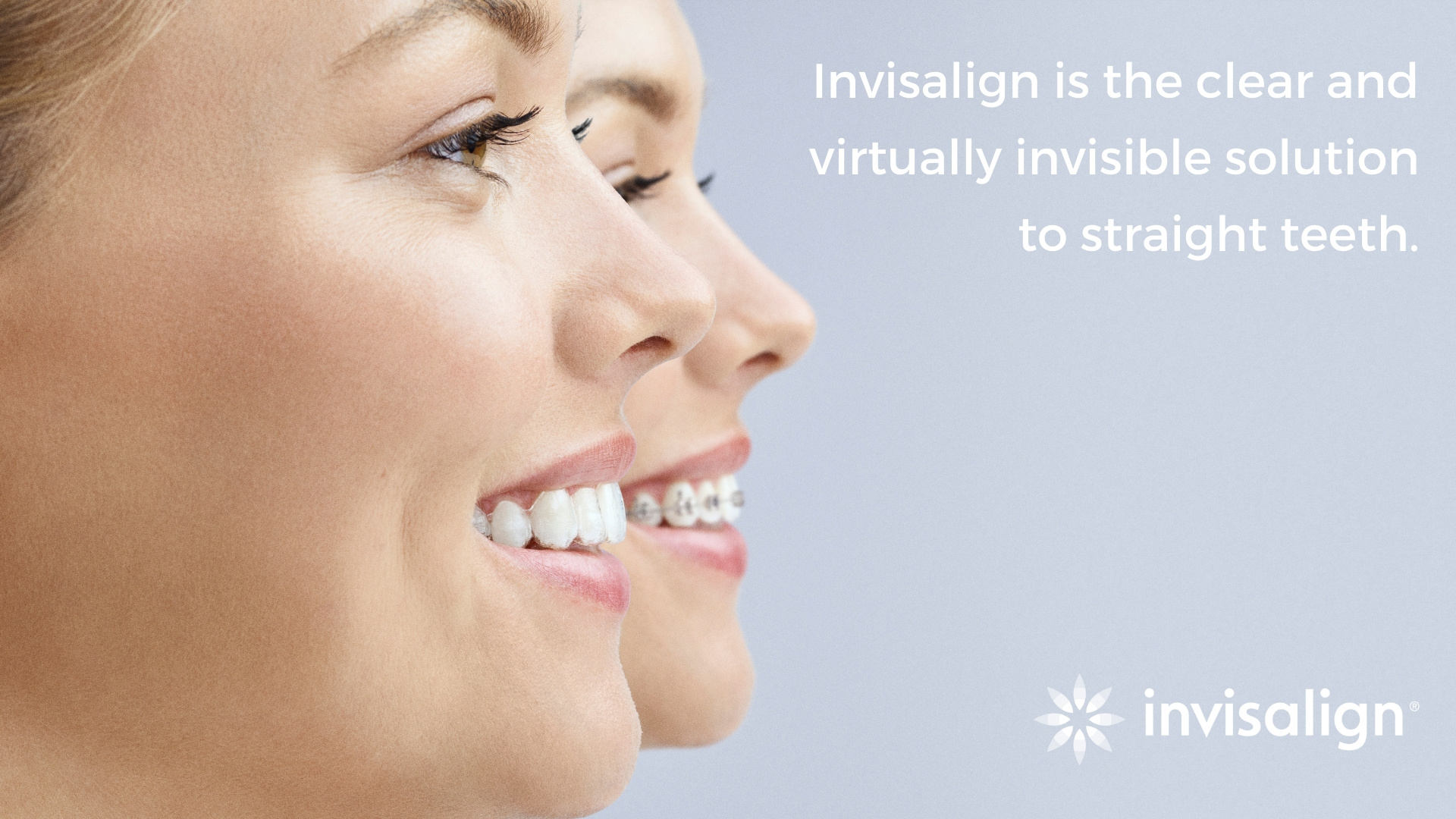
Jasmine Ooi BPharm
Co-Founder
Method Dental
with Dr. Grant McGrath BDSc
Co-Founder, Dentist
Method Dental


